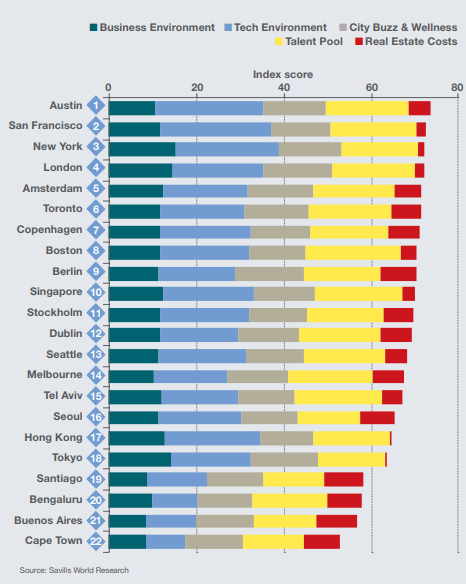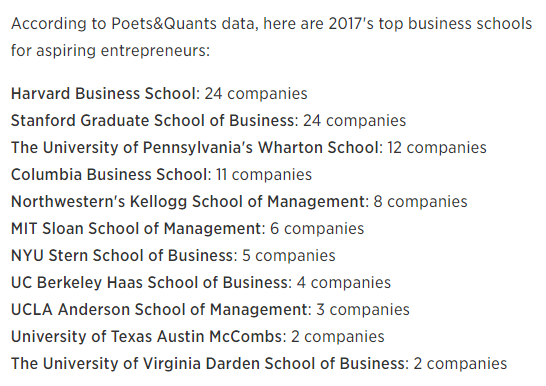Latest news about Bitcoin and all cryptocurrencies. Your daily crypto news habit.
 School is not a prerequisite — Charlie Munger
School is not a prerequisite — Charlie Munger
Many successful billionaires are school dropouts (As per Fortune, about three out of 10 billionaires — 29.9% — around the world did not have at least a bachelors degree in 2015). Many experts think entrepreneurship cannot be taught in school. Yet, many schools do a great job of producing entrepreneurs. This article looks at the ingredients required to create successful startups and attempts to reframe the question by asking whether the debate should be about going to school or not but rather where are you more likely to find the ingredients needed to launch a successful startup?
Education, at a minimum, is an insurance policy for those in the middle of the distribution which could literally mean most of us. Outliers, on the other hand made it successful despite the lack of education. But, what if all stars had not aligned the way these outliers dreamt of?
In a world filled with uncertainty, there are no easy answers just like there are no one size fits all solutions. Perhaps, only the paranoid survive an entrepreneurs’ journey.
No Substitute For Real Life Experience
Late one night, I was at the dinner table with my cousin. He was laughing at corporate employees not being able to transition to entrepreneurship as if a 9 to 5 job was somehow below that of an entrepreneur. He firmly believed that people who spend too much time in books or thinking inside the box in a desk job may not be cut out for entrepreneurship. According to him, entrepreneurs just plunge into business without spending too much time on books.
I did not take his laughter lightly because I do believe that nothing can beat real life experience. However, if you are an astute student, being part of a business in the corporate world can teach you the ropes until you decide to take the plunge. Getting into a job that allows you to manage a profit and loss account often requires a formal education.
However, the close confines of a familiar setting (business school) may not tell you much more about the value of your product than the actual sale of a few units.
Client is King
There were many critics of the Apple touch screen, the Apple iPad and the Apple AirPods. In fact, Apple bashing was a full time endeavor for some. Despite all the criticism, Apple’s innovations succeeded. Maybe, if a business school student would have done a focus group or survey to figure a product market fit, most respondents would have adverse reactions to these innovations. The other side of the argument is that Apple can afford to take such risks, a startup cannot. However, Apple was once a startup and Steve Jobs did lose his way once.
For any entrepreneur today, failing small and fast is key. An entrepreneurs’ immediate network may be a good way to understand if someone would pay for his/her product or service.
An inherent danger in academia can be homogeneity of thought and lack of out of box thinking. For instance, companies like Amazon and Tesla, which do not fit the traditional mould of companies reporting quarterly profits, would be considered bad investments by traditional investing principles which business schools often rely on as a time tested framework. Yet, Amazon and Tesla enjoy outsized market capitalizations defying metrics such as PE ratio or EPS.
In a rapidly changing world, some case studies may have already become obsolete and the drivers of success could have changed. Thus, unconditioning the mind may be harder than just plunging into a venture headlong.
Having said that, the most scalable companies can explain the value of their products or services using plain English. Therefore, one of the first questions to ask is: how is your product adding value to the client while being different from the competition? In other words, what is the products Unique Selling Point (USP). Therefore, irrespective of how you become an entrepreneur, the fundamental questions remain the same.
Being Part of An Ecosystem
Seattle, Silicon Valley, Singapore, Israel and Estonia are all icons of a great ecosystem. Israel became a startup hub due a large part to the compulsory military service that teaches survival despite all odds and instills discipline.
Most of the cities featured in the Savilla World Research report also have vibrant educational institutions. All of these cities offer a vibrant ecosystem that fosters collaboration.
Having said that, not all of the success can be replicated. Estonia emerged as a phoenix from the ashes and become a completely digital country from the ground up. Not all of the same lessons cannot be applied to a country like India where different levels of development and democracy may slow down the reform process.
Rome Was Not Built In A Day
It takes time for cities to become a breeding ground for entrepreneurs. Austin and St. Louis are great examples. St. Louis has become a startup hub for biotech and life science startups. A mid-western city which has a strong university presence, several incubators and venture capital funds.
Similarly, university programs in Entrepreneurship evolve over time. Strong Alumni connections encourage giving back. Much of this donation is in terms of mentoring young entrepreneurs.
Attracting talent is key but without the absence of an ecosystem, it is hard to do so. Startups need government policy support to blossom and to create jobs which will lead to a virtuous cycle of attracting other entrepreneurs.
Feedback from this virtuous cycle can be captured by universities in the form of frameworks that can guide the thinking of a future generation of entrepreneurs. Research, by its very nature, may take decades to provide returns.
Parting Thoughts
As per Fortune magazine: “The vast majority of billionaires however did make it to a bachelors degree, and many went farther. Twenty-two percent went on the nab a Master’s degree, while 13.1% of all billionaires earned an MBA”
The reason I titled this article Alchemy of Business is because business is truly an alchemy with some secret ingredient thrown in to turn an idea into pure gold. If you ask entrepreneurs, a lot of them will honestly credit their luck, great partners, timely funding, an idea whose time had come etc. A successful business is a potpourri of various ingredients. It is only when these elements come together in perfect harmony that a business blooms.
The value of universities or formal education may lie in providing access to capital (intellectual and monetary), great founding partners, a relatively less risky way to test ideas, teachers and a cohort that may willingly become test subjects or sounding boards. Unless alternate educational systems are devised that can outmatch today’s institutions, the biggest value an educational institution can provide is its brand. A brand that has stood the test of time.
However, there is one ingredient that truly pushes people to be the best and it is their inner drive. There are many motivators of inner drive namely poverty, pain, a desire to be the best. Call it what you will but the drive to excel and a drive to do good by society cannot be taught in any institution. That is the precise reason why entrepreneurship cannot be boiled down to a science. It is an art that can be mastered by practice but never completely.
For most of us, a formal education may serve as the difference between destitution and resilience. For the rest, the stars may align.
The strongest argument today in favor of formal education is that it provides an established base to unlock the potential of women entrepreneurs around the world. It begins by making women financially independent and increasing their appetite for risks.
Educational institutions can therefore provide a framework and some of the ingredients but inner drive is a matter of subjectivity. For now, we live in interesting times where the value of academia to an entrepreneur cannot be dismissed.
The Alchemy of Business was originally published in Hacker Noon on Medium, where people are continuing the conversation by highlighting and responding to this story.
Disclaimer
The views and opinions expressed in this article are solely those of the authors and do not reflect the views of Bitcoin Insider. Every investment and trading move involves risk - this is especially true for cryptocurrencies given their volatility. We strongly advise our readers to conduct their own research when making a decision.


